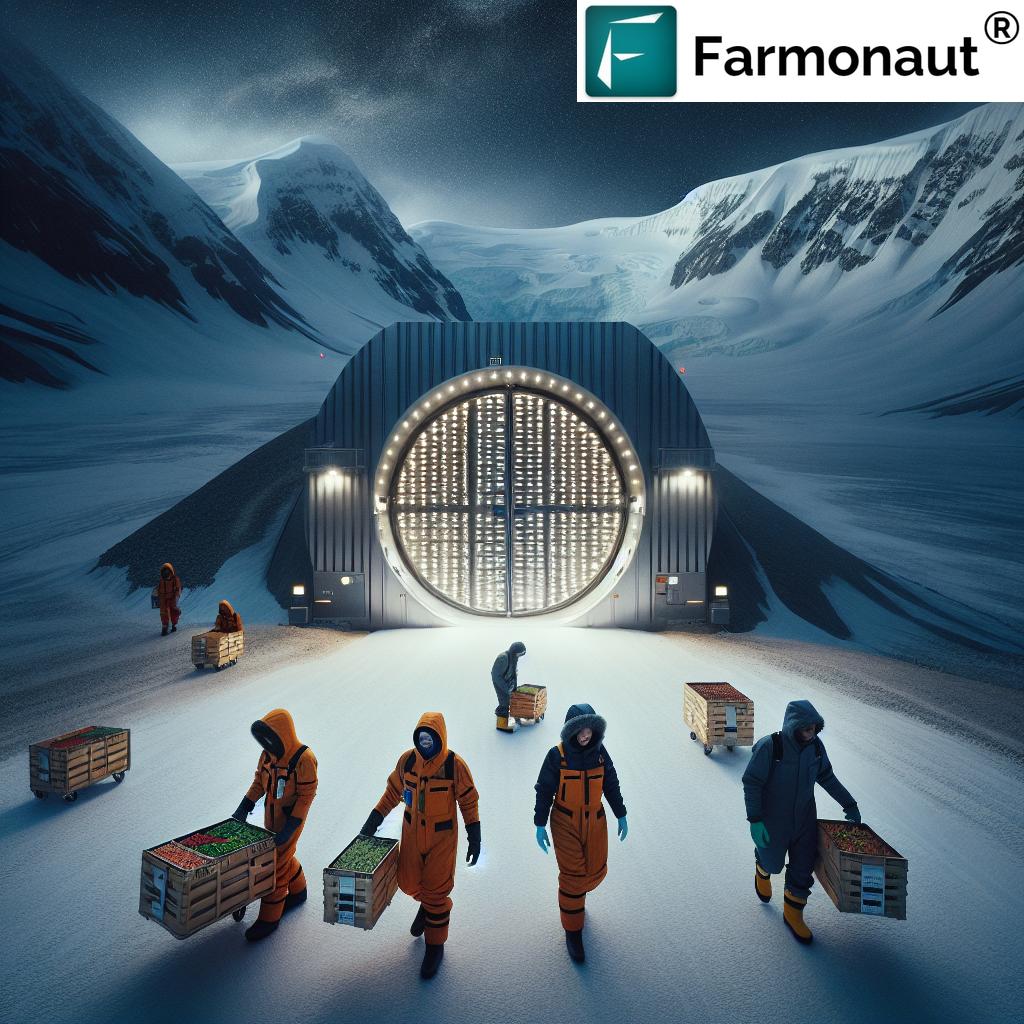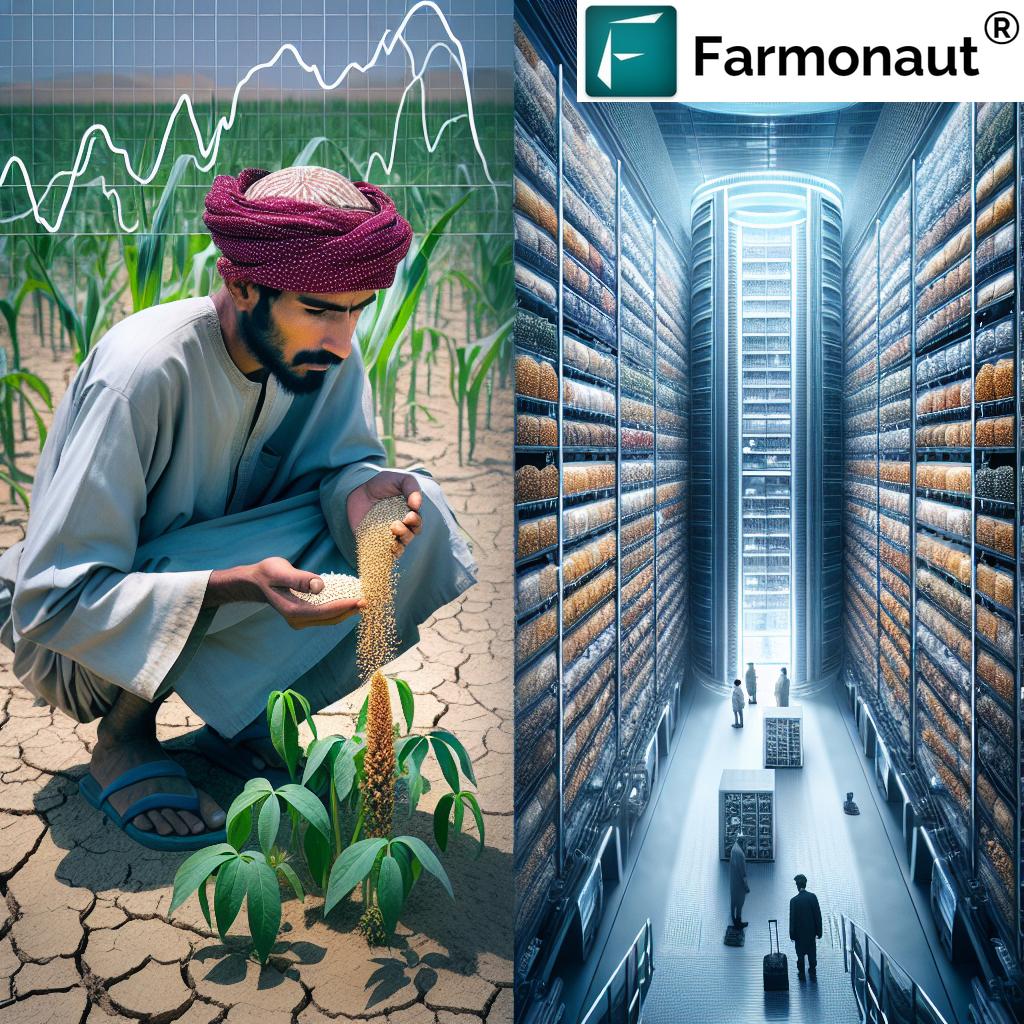Unlocking the Arctic Vault: Vital Seeds Safeguarded Against Climate Crisis and Global Conflict

In a world grappling with the twin threats of climate change and global conflict, the Svalbard Global Seed Vault stands as a beacon of hope for food security and agricultural resilience. Recent developments at this Arctic fortress of biodiversity underscore its critical role in safeguarding our planet’s future.
Arctic Seed Vault Update: A Surge in Deposits
The latest Arctic seed vault update reveals a significant milestone: the facility has received samples from the largest number of depositors since 2020. This surge in Svalbard Global Seed Vault deposits reflects growing global concern over the impacts of climate change and conflict on our food systems.
Stefan Schmitz, executive director of the Crop Trust, emphasizes the gravity of the situation: “Climate change and conflict threaten infrastructure and impact food security for over 700 million people in more than 75 countries worldwide.” This stark reality underscores the vital importance of the vault’s mission.
The Doomsday Vault: A Fortress of Hope
Often referred to as the “doomsday vault,” the Svalbard facility is much more than a last resort. It serves as a cornerstone in the global effort for crop biodiversity conservation and genetic preservation. The vault’s location on Norway’s Spitsbergen island, deep within an Arctic mountain, provides natural protection against various threats, from nuclear war to rising sea levels.
The importance of this global seed bank cannot be overstated. It acts as a backup for the world’s gene banks, storing the genetic code for thousands of plant species. This doomsday seed storage facility has already proved its worth, playing a crucial role in rebuilding seed collections damaged during the Syrian conflict between 2015 and 2019.

New Contributions: Preserving Cultural Heritage and Adapting to Climate Change
The recent wave of deposits to the Svalbard Global Seed Vault includes some notable first-time contributors:
- Bolivia’s Inaugural Contribution: The 400-year-old Universidad Mayor Real y Pontificia de San Francisco Xavier de Chuquisaca made Bolivia’s first deposit to the vault. This collection, assembled by 125 farming families from local communities, represents more than just seeds. As the project coordinator stated, “This deposit goes beyond conserving crops; it’s about protecting our culture.”
- Chad’s Climate-Resilient Seeds: Another newcomer, Chad, deposited 1,145 samples of sesame, rice, maize, and sorghum. These seeds are adapted to Chad’s climate and are crucial for developing crops that can withstand rising temperatures and erratic rainfall – a key aspect of climate change adaptation in agriculture.
- Palestinian Contributions: The Union of Agricultural Work Committees in the occupied Palestinian territories contributed seeds of vegetables, legumes, and herbs, further diversifying the vault’s collection.
These new additions bring the total to more than 30,000 new samples from 21 countries, significantly enhancing the vault’s role in protecting crop biodiversity and ensuring agricultural resilience preservation.
The Global Seed Bank Importance: Safeguarding Our Future
The Svalbard Global Seed Vault’s significance extends far beyond its icy confines. It represents a global commitment to preserving biodiversity and ensuring food security for future generations. Here’s why this Arctic seed storage facility is so crucial:
- Biodiversity Protection: By storing a vast array of plant species, the vault helps protect against the loss of genetic diversity due to climate change, conflicts, or other disasters.
- Food Security Insurance: In the event of large-scale crop failures, the stored seeds can be used to regenerate lost varieties, ensuring continued food production.
- Climate Change Adaptation: The diverse genetic resources stored in the vault are essential for developing crop varieties that can adapt to changing climate conditions.
- Cultural Preservation: As demonstrated by Bolivia’s contribution, the vault also helps preserve the agricultural heritage and cultural practices of communities worldwide.
For those interested in leveraging technology for agricultural resilience, Farmonaut’s satellite-based crop monitoring app offers valuable insights for modern farming practices.
The Future of Food Security: Integrating Technology and Traditional Knowledge
As we face unprecedented challenges to our food systems, the integration of traditional agricultural knowledge with modern technology becomes increasingly important. The Svalbard Global Seed Vault represents one aspect of this fusion, preserving ancient crop varieties alongside modern cultivars.
Complementing these efforts, innovative technologies like satellite monitoring and AI-driven analytics are revolutionizing agriculture. For instance, Farmonaut’s Satellite API provides real-time data on crop health and environmental conditions, enabling farmers to make informed decisions and adapt to changing climates.
For developers interested in integrating these capabilities into their own applications, Farmonaut’s API documentation offers comprehensive guidance.
A Call to Action: Supporting Global Seed Bank Initiatives
The recent surge in deposits to the Svalbard Global Seed Vault serves as a reminder of the critical importance of such initiatives. As individuals and communities, we can support these efforts in several ways:
- Advocate for increased funding and support for seed banks and biodiversity conservation projects.
- Participate in local seed-saving initiatives to preserve regional crop varieties.
- Support agricultural research aimed at developing climate-resilient crop varieties.
- Educate others about the importance of crop diversity and genetic preservation.
By taking action, we can contribute to the global effort to safeguard our agricultural heritage and ensure food security for future generations.
Conclusion: A Seed of Hope in Uncertain Times
The Svalbard Global Seed Vault stands as a testament to human foresight and international cooperation. As we face the challenges of climate change and global conflict, this Arctic fortress of biodiversity offers a seed of hope for our collective future.
The recent influx of deposits from around the world demonstrates a growing awareness of the need to protect our plant genetic resources. From Bolivia’s cultural heritage to Chad’s climate-adapted crops, each sample stored in the vault represents a potential solution to future agricultural challenges.
As we move forward, it’s clear that preserving crop biodiversity is just one piece of the puzzle. Integrating this valuable genetic resource with modern agricultural technologies and practices will be key to ensuring food security in a changing world.
For those looking to stay at the forefront of agricultural innovation, Farmonaut offers cutting-edge solutions:
In the face of global challenges, initiatives like the Svalbard Global Seed Vault remind us of our capacity for foresight and collaboration. By continuing to support and expand such efforts, we can work towards a more resilient and food-secure future for all.


